I went to Anton Corbijn’s A Most Wanted Man almost completely cold. I knew who made it. I knew it starred Philip Seymour Hoffman. I knew it was based on a John le Carré novel. That was it. Oh, I knew it had been well reviewed, but I had read none of those. What I found was a good movie straining rather desperately to be a great one — and battling a few bad choices in the process. It’s essentially a Cold War spy story that takes place in a post-Cold War age. Le Carré’s point seems to be that the difference between espionage and bargaining in the Cold War and that found in the “war on terror” is minimal. The author once described his Cold War spies as a “mostly aging, weary, unromantic lot, prone to distressing stomach ailments,” and the professionals here fit the same description. It’s an interesting approach to post-9/11 counter-terrorism that results in an intelligent and mostly intelligently crafted film. Whether it makes for terrifically exciting moviegoing may be another matter. For me, at least, it’s a sometimes yes, sometimes no answer. The often unbridled energy of Philip Seymour Hoffman makes it seem more intense than it probably is.
Hoffman plays Gunter Bachmann, a man who runs a secret anti-terrorism agency in Hamburg. He very much plays by the rules of Cold War pragmatism and is more inclined to bide his time in the belief that it’s better to land a big fish than a small one. The problem with this approach is that it doesn’t sit well with Dieter Mohr (Rainer Bock), the by-the-book, arrest-happy head of Hamburg intelligence. It’s essentially the difference between a patient man and one interested in immediate gratification. Given le Carré’s background, it’s no surprise that the story favors Bachmann’s approach.
The point of contention between the two here is young half-Chechen, half-Russian refugee Issa Karpov (Grigoriy Dobrygin). Karpov — having been imprisoned and tortured in his own countries — finds some support in an Islamic household in Hamburg and representation through human rights lawyer, Annabel Richter (Rachel McAdams), who promises to help the young man claim a hefty inheritance. The problem is that Karpov has been classified as an escaped jihadist. Not surprisingly, Mohr wants to arrest him. Bachmann has other, much more elaborate ideas. Thereby hangs the drama that becomes increasingly complex — to the point that it’s not entirely clear what’s going on until the film’s final stretch.
In the main, the film works, despite the fact that it appeals more to the viewer’s intellect than his or her emotions. It’s almost entirely cerebral and devoid of both the stylishness and dry sense of humor found in Tomas Alfredson’s 2011 film of le Carré’s Tinker Tailor Soldier Spy. A Most Wanted Man rarely cracks a smile, and this is not really in its favor. Also of doubtful merit is the choice of having Hoffman, McAdams and Willem Dafoe affect vague German accents. It’s not only distracting, but the decision to downplay the accents makes you wonder why they bothered. The film could have also done with less ragged hand-held camera, which, despite what might be thought, really doesn’t lean a sense of immediacy to the proceedings.
All in all, however, A Most Wanted Man is a good, intellectually engaging film. Despite the dodgy accents, the three “movie star” leads — Hoffman, McAdams, Dafoe — give compelling performances. Hoffman is particularly strong, managing to suggest both the complexity and barely contained mix of rage and world-weariness of Bachmann. As a posthumous showcase for the actor, it is certainly superior to the disappointing God’s Pocket. It is worth seeing for Hoffman alone, but most of the cast is excellent. Just remember, the last thing you’d call the film is “action packed.” Rated R for language.

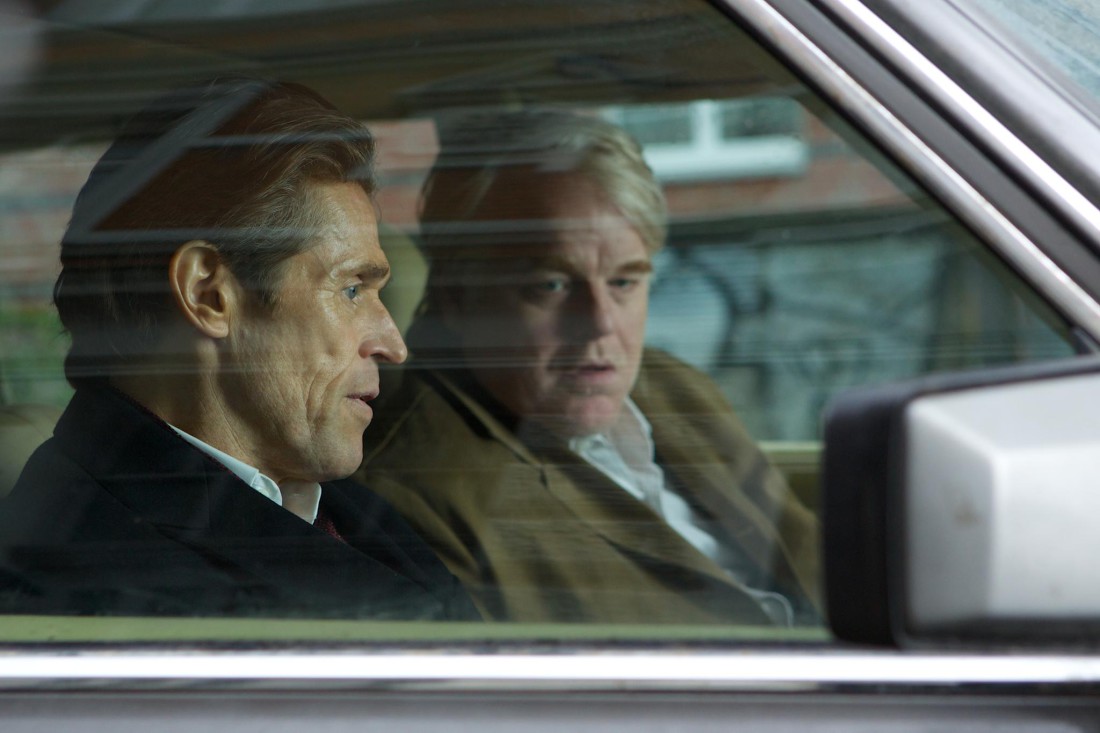
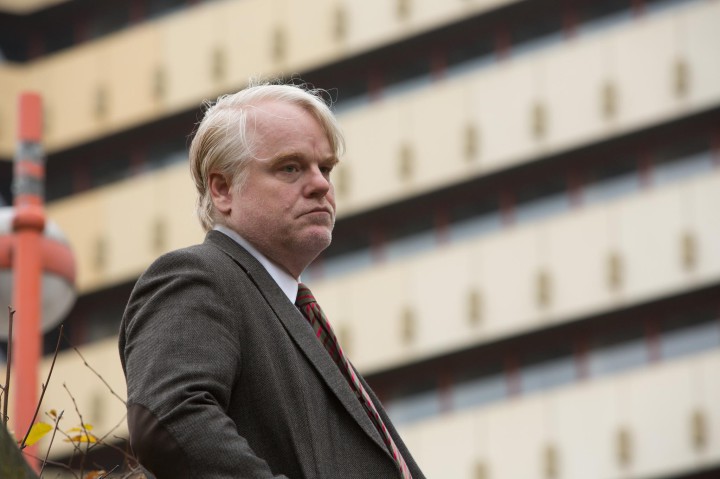

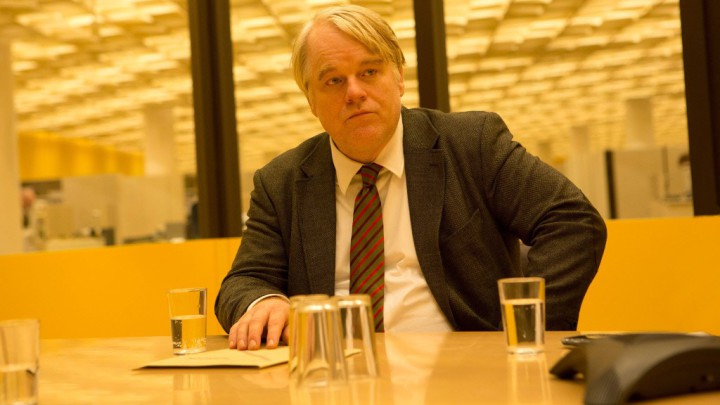

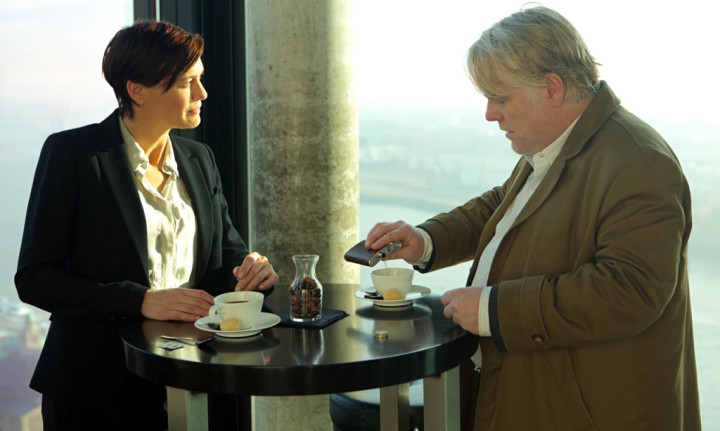
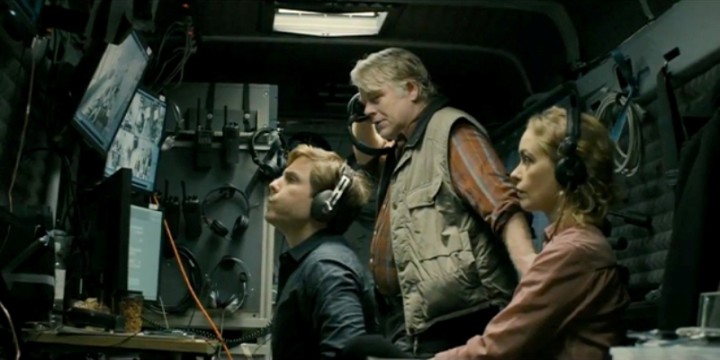

Also of doubtful merit is the choice of having Hoffman, McAdams and Willem Dafoe affect vague German accents.
At least Dafoe’s has the benefit of being reminiscent of his Klaus from The Life Aquatic. (I so wanted him to call someone “Sonny.”) Hoffman tries…a little too hard and I don’t know what McAdams was doing, but it feels like a German accent by way of a British one.
In all fairness, Europeans tend to learn English from Brits, so that’s not impossible.
That’s true. My best friend from my London semester is from Norway and when we met he had more of an American-tinged English. When he came here to visit in 2011 after staying in London for seven years, he sounded like a Brit.
Is it at least better than Cotillard’s Andy Kaufman impression in the Immigrant?
Well, since I don’t even slightly agree with — or even understand — that assessment, I’m saying no.
Eh?
Is he saying she sounds like Latka?
I have no earthly idea, but not being any kind of fan of the mystifyingly revered Mr. Kaufman may be a factor here.
Check out the scene where she says “thank you very much” with perfect Kaufman inflection.
I assure you no such thing occurred to me at any point in the film.
“It wants to be more than it is” writes Hanke. No elaboration of what that might possibly mean. Beats me. Maybe LeCarre wanted the book to be more than it was. Maybe two books??
Maybe if that abbreviated remark had been about the book rather than the movie you’d be onto something.